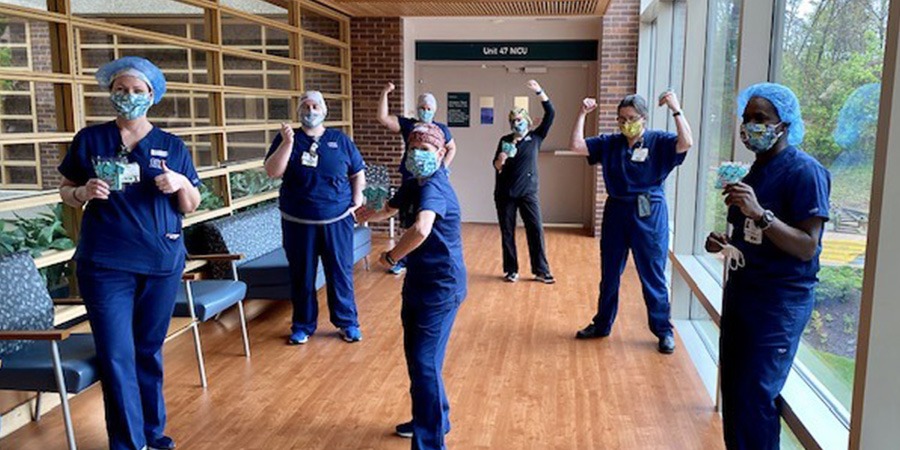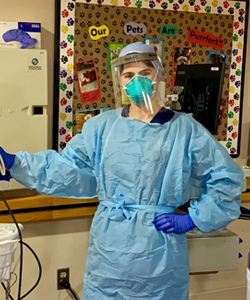Life Inside a COVID-19 Unit
May 13, 2020
On March 27, 2020, the lives of the nurses on Unit 48 were forever changed. The once outpatient surgical unit quickly transformed into a coronavirus (COVID-19) unit where Patients Under Investigation (PUI) and positive COVID-19 patients would receive care. At the time, very little was known about the virus or how serious the situation would become. “The unknowns made things daunting but as nurses we have a duty to be a part of something greater than ourselves. For me, it was a huge honor to be part of something so important and I found it very humbling,” said Arielle Messafi, BSN, RN II, nurse on Unit 48.
The first patient admitted to the unit exhibited many of the symptoms associated with COVID-19 – cough, shortness of breath, and fever – and although they were still a PUI, it was highly likely that their COVID-19 test would return as positive. Despite the risk to herself, Arielle volunteered to treat the patient. “I’m fortunate in that I don’t have any comorbidities that would put me at too high of a risk to treat him,” she explained, “I took it as an opportunity to serve in a way that I had never been able to before.”

It was later confirmed that Arielle’s patient was a positive COVID-19 case. Thankfully, they recovered and were able to be discharged. However, as the pandemic accelerated, the number of patients on the unit followed suit. “No week was the same and treating patients became a completely different ballgame,” Arielle described. One of the biggest challenges she found was that patients couldn’t see her smile under all the Personal Protective Equipment (PPE). Nurses normally greet their patients with a smile to put them at ease; but under the N95 mask and droplet shield, it is almost impossible to see someone’s face.
The nurses on Unit 48 have worked to find other ways to provide comfort to their patients such as relaxing music, meditation, and guided imagery. In order to reduce exposure, they frequently call into the rooms to check on their patients’ emotional state and get them anything they may need. They are doing everything they can to make sure patients know they are not alone.
Communicating with patients’ family members and loves ones has also proven difficult. Due to the hospital’s visitor restrictions, nurses are unable to provide in-person updates – something that significantly increases stress for family and friends who are concerned for their loved one. “All of the negative news coverage and content on social media creates huge anxiety for the family,” said Arielle, “we do our best to reassure them, but it’s so much harder over the phone.”
Arielle’s life outside of work has experienced a dramatic change as well. Before even getting into her car, Arielle wipes down everything she’s bringing home, from her water bottle and pens to her badge and shoes, and changes out of her scrubs. She considers these to be small sacrifices to protect her family and the community. When asked what she would say to the community, she responded:
“I want readers to know that this pandemic can only be resolved if we all work together. As healthcare professionals, we are relying on the community for support and to stay home. Everyone’s health and safety depends on it – your role in this is as important, if not more important, than ours.”
To learn more about how you can give back during this time, please visit www.gbmc.org/donations or donate to the GBMC HealthCare Workers Fund to support our healthcare heroes like the nurses on Unit 48.
*Click here for more information and articles about the coronavirus (COVID-19)*


